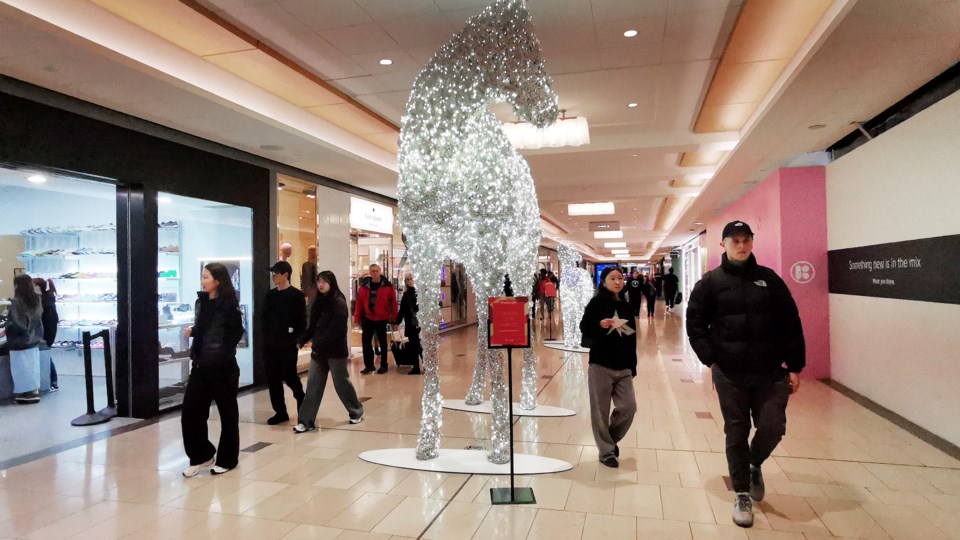A combination of factors is set to make this holiday season unlike any other for B.C. retailers.
While good news comes from an Ipsos and BMO survey in September, which found that British Columbians expected to spend more money during the holidays than did Canadians in any other province, most dynamics making this year distinctive have the potential to hurt retail sales.
The federal government’s mandate that retailers remove the goods and services tax (GST) on some but not all taxable items between December 14 and February 15 is the most unexpected of the challenges merchants must manage.
This is because the government has never enacted this kind of tax holiday.
Wine is one of the products included in the so-called “GST holiday,” but even wine merchants told BIV they were not impressed with the initiative, which forces them to do more work during their busiest time of year.
Marquis Wine Cellars owner John Clerides told BIV he believes the tax change is a haphazard policy and one that was put in place for political purposes.
“I had to get my CFO to look into it,” he said. “We have to print new tags and do all sorts of stuff, which the consumer doesn't care about. All they care about is lower prices. If that helps sales, then great. I don’t know if it will as this is unprecedented.”
Wine sales spike in the final three months of the year and Clerides called the time a “make-or-break quarter,” and one when he does not want to waste resources on changing price tags and point-of-sale system technology.
British Columbia Liquor Distribution Branch data for wine wholesales back up his claim that the final quarter of the year by far has the most sales.
The province’s monopoly alcohol distributor sold nearly $317 million worth of wine wholesale in October through December last year. That was more than 21.5 per cent above an average of $260.8 million in each of the following three quarters.
Canada Post strike adds burden for retailers
Clerides’ staff has also shouldered heavier workloads since Canada Post workers went on strike in mid-November.
Marquis Wine Cellars provides free delivery for online customers who buy more than $250, he said.
Clerides uses Canada Post to deliver orders because its delivery rates are lower than those from Purolator, FedEx and other delivery companies, he said.
The strike means that he is getting his staff to make local deliveries.
In cases where online buyers purchase less than $250 worth of wine and need to pay shipping fees, the cost has gone up to the point where Clerides said he believes he has lost sales.
Some retailers told BIV that they have been frustrated with orders getting stuck in transit.
Yaletown retailer Durriya Rehan, who owns Fine Finds, told BIV that she shipped an advent calendar to a customer on November 12. It got stuck somewhere in Canada Post’s distribution network when workers went on strike.
The customer cancelled the order and Rehan said she felt compelled to refund his money because he did not receive his purchase.
Arkun Durmaz, the Canadian president of Istanbul, Turkey-based Mavi Jeans, told BIV he has five stores in Metro Vancouver but most of his company’s North American business is wholesale.
The Canada Post strike has hindered his ability to ship inventory to resellers. It has also caused many payments from his resellers to get stuck in the mail, he said.

Some of those resellers have shifted to using e-transfers but Durmaz said Mavi Jeans is forced to wait for accounts-receivable payments that were made by mailed cheques until the strike is over.
“More consumers are going to be going into bricks-and-mortar stores if they feel like they're not able to get products when they buy online,” said retail consultant and Retail Insider Media owner Craig Patterson.
"This could be a year that is a better time for retailers that have physical locations.”
Later shopping season could reduce retail sales
Retailers are hoping that having a late Black Friday does not crimp overall sales.
Black Friday this year fell on November 29—the latest possible date as it follows American Thanksgiving, which falls on the fourth Thursday of the month.
Last year, Black Friday fell on November 24, meaning that there were five more shopping days between Black Friday and Christmas.
Initial data from Salesforce found that online Black Friday sales in Canada were down six per cent to $309 million when compared with last year.
By contrast, global data shows Black Friday sales increased five per cent year over year to $74.4 billion.
Canada’s comparatively sluggish economy and GDP growth may be to blame. Canadian GDP growth last year was 1.1 per cent, compared with 2.5 per cent in the U.S., according to the World Bank.
Moneris data released today found that B.C. shoppers were more enthusiastic about Black Friday than were counterparts in the rest of Canada.
B.C. shoppers spent 34-per-cent more on Black Friday than they had on the Friday one week earlier, according to Moneris. That compares with a sales bump of 29-per-cent nationally.
Canadian retailers in the past decade have learned to count on holiday shopping starting with a bang on Black Friday.
That holiday shopping bonanza was historically largely a phenomenon that stayed south of the border, and was not in Canada until the aught years, said DIG360 retail consultant and owner David Ian Gray, who closely tracks Black Friday sales.
His company teams up with Angus Reid Group to survey shoppers and issue annual reports.
Gray told BIV that last year 49 per cent of respondents bought at least one item that was part of a Black Friday promotion, while 73 per cent of respondents either browsed Black Friday deals or purchased an item that was on sale.
Both of those figures were the highest since DIG360 started tracking Black Friday interest in 2010.
Gray said he does not expect that the share of Canadians who participated in Black Friday shopping this year to be considerably more than last year’s level because he said he thinks there is a large slice of the population that just buys items when needed, avoids hyped sales promotions and views the consumer frenzy with disdain.
“There will be a sizable minority that wants to opt out,” he said.
Another phenomenon prompting a later holiday shopping season is the GST’s slated removal from a range of goods starting December 14.
Items to be newly GST-free include children’s clothing, children’s toys, books, beer that has up to seven per cent alcohol, restaurant meals and a miscellany of other items.
Shoppers may delay their shopping to pay less in tax.
Confusion is then likely to reign for many consumers who do closely follow government pronouncements.
They may wrongly believe that flat-screen TVs or other products will be exempt from the GST and postpone their purchases of those items for that reason.
Undoubtedly, retailers will have to deal with unhappy customers who learn in their stores that the GST continues to apply to many products.
Even retail professionals told BIV that the government’s list of exempted items is not clear. While children’s toys, such as board games and dolls designed for children younger than 14 years, are to be exempt, other toys could continue to carry the tax.
Patterson added that the timing of the GST holiday is not ideal for some items. Christmas trees will be exempt from the GST starting December 14 even though most Christmas tree shoppers will likely have already bought their trees, he said.
One consequence of more consumers procrastinating on their holiday shopping and pushing it into the future is that they may get busy with other things and not complete their purchases by Christmas, hurting retailers in the process.





